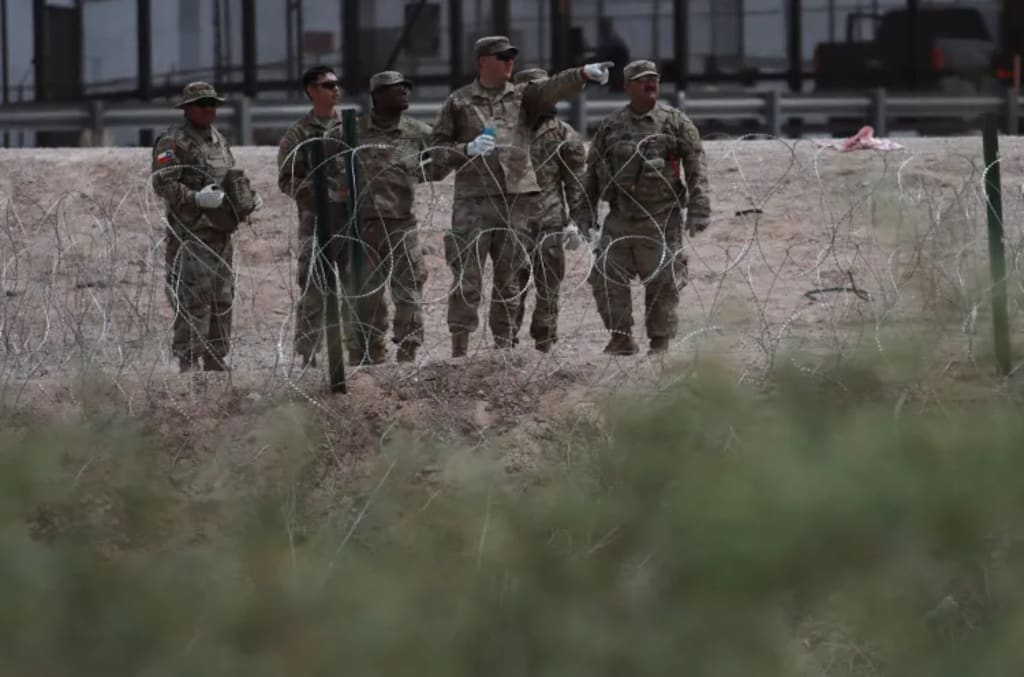Breaking News: What to Expect as Biden Sends 1,500 Troops to US-Mexico Border
On April 30, 2021, the Biden administration announced that it would be deploying 1,500 troops to the US-Mexico border.

As President Joe Biden sends 1,500 troops to the US-Mexico border, many Americans and immigrants alike are wondering what this move will mean for border security, the ongoing migrant crisis, and US foreign policy. While the Biden administration has made it clear that the troops will not be involved in immigration enforcement or detention, their presence could still have significant implications for the border region and beyond. In this article, we'll explore what to expect as Biden sends 1,500 troops to the US-Mexico border, including the reasons behind the decision, the potential impact on immigration policy, and the broader implications for US foreign relations.
Introduction: The Troop Deployment and Its Significance
On April 30, 2021, the Biden administration announced that it would be deploying 1,500 troops to the US-Mexico border. The deployment comes amid a surge in migrant arrivals at the border, which has strained US border security and immigration enforcement systems. The troops, who will be deployed for six months, will provide logistical support to US Customs and Border Protection (CBP) agents and will not be involved in immigration enforcement or detention. The administration has stated that the troop deployment is meant to provide "much-needed" support to CBP and help stem the flow of illegal immigration into the United States.
The Reasons Behind the Troop Deployment
The decision to deploy troops to the US-Mexico border has been met with mixed reactions from lawmakers, advocacy groups, and the public. Some argue that the move is necessary to address the ongoing migrant crisis and to provide much-needed support to CBP agents, who have been overwhelmed by the surge in migrant arrivals. Others, however, are concerned that the troop deployment could be a precursor to more aggressive immigration enforcement measures or could lead to increased militarization of the border.
So, why did the Biden administration decide to deploy troops to the US-Mexico border? There are several reasons behind the decision, including:
1. Addressing the Surge in Migrant Arrivals
One of the primary reasons for the troop deployment is to address the surge in migrant arrivals at the US-Mexico border. Since Biden took office in January 2021, there has been a significant increase in the number of migrants attempting to cross the border illegally. This surge has strained border security and immigration enforcement systems, leading to overcrowding at detention facilities and an increase in asylum claims.
The troop deployment is meant to provide additional support to CBP agents and help manage the flow of migrants at the border. Troops will be involved in tasks such as constructing temporary facilities, providing transportation for migrants, and conducting maintenance on CBP equipment.
2. Supporting CBP Agents
Another reason for the troop deployment is to provide much-needed support to CBP agents, who have been stretched thin by the surge in migrant arrivals. CBP agents are responsible for a range of tasks, including border security, immigration enforcement, and responding to humanitarian crises. The troop deployment is meant to help alleviate some of the burden on CBP agents and ensure that they have the resources and support they need to carry out their duties effectively.
3. Demonstrating a Tough Stance on Immigration
Finally, the troop deployment can be seen as a signal that the Biden administration is taking a tough stance on immigration. While the administration has emphasized that the troops will not be involved in immigration enforcement or detention, the move could still be interpreted as a show of force against illegal immigration. Some lawmakers and advocacy groups have expressed concern that the troop deployment could be a precursor to more aggressive immigration enforcement measures, such as increased border wall construction or mass deportations.
The Potential Impact on Immigration Policy
While the troop deployment is not expected to have a direct impact on immigration policy, it could still shape the administration's approach to the ongoing migrant crisis. Here are a few potential ways that the troop deployment could affect immigration policy:
The decision to send troops to the US-Mexico border is a significant development and has been classified as Breaking News. This decision comes in the wake of an ongoing immigration crisis at the southern border, and it demonstrates the Biden administration's commitment to addressing the issue. With the deployment of troops, there is likely to be an increased presence at the border, and this could have significant implications for both migrants and border security. As more details emerge about this decision, it's important to stay informed and understand the potential impacts.
1. Reinforcing the Importance of Border Security
By deploying troops to the US-Mexico border, the Biden administration is emphasizing the importance of border security. While the administration has taken a more compassionate approach to immigration than its predecessor, it has also made it clear that it takes border security seriously. The troop deployment could be seen as a way to reinforce this message and demonstrate the administration's commitment to protecting the US border.
2. Providing Temporary Relief
The troop deployment is meant to provide temporary relief to CBP agents and help manage the surge in migrant arrivals. While it is not a long-term solution to the ongoing migrant crisis, it could help alleviate some of the pressure on border security and immigration enforcement systems. However, it is important to note that the troop deployment is not a substitute for comprehensive immigration reform, which is needed to address the root causes of illegal immigration and provide a pathway to citizenship for undocumented immigrants.
3. Increasing Political Pressure
The troop deployment could increase political pressure on the Biden administration to take more aggressive action on immigration. Some lawmakers and advocacy groups have criticized the administration's approach to the migrant crisis as too lenient, and the troop deployment could be seen as a way to placate these critics. However, it could also lead to calls for more militarization of the border or other measures that could be harmful to immigrants and refugees.
The Broader Implications for US Foreign Relations
The troop deployment to the US-Mexico border could have broader implications for US foreign relations, particularly with Mexico and other Latin American countries. Here are a few potential ways that the troop deployment could affect US foreign policy:
1. Straining Relations with Mexico
The troop deployment could strain relations between the US and Mexico, which have already been strained in recent years. Mexican officials have expressed concern about the troop deployment, with some calling it a violation of Mexican sovereignty. If the troop deployment leads to increased tensions between the two countries, it could make it more difficult for the US to work with Mexico on issues such as trade, immigration, and security.
2. Sending a Message to Other Latin American Countries
The troop deployment could also send a message to other Latin American countries about the US's approach to immigration and border security. If the troop deployment is seen as a show of force against illegal immigration, it could lead to increased migration to other countries in the region. This could have implications for US relations with other countries, particularly those that are already struggling with their own migrant crises.
3. Highlighting the Need for Regional Cooperation
Finally, the troop deployment could highlight the need for regional cooperation on issues such as migration and border security. The US cannot address the migrant crisis alone, and will need to work with other countries in the region to find solutions. The troop deployment could be seen as a way to jump-start this cooperation and encourage other countries to take a more active role in addressing the crisis.
FAQs
1. Will the troop deployment lead to increased immigration enforcement at the border?
No, the troop deployment is not expected to involve immigration enforcement or detention. Troops will be providing logistical support to CBP agents and helping to manage the flow of migrants at the border.
2. How long will the troops be deployed to the border?
The troop deployment is expected to last for six months, although this could be extended if necessary.






Comments
There are no comments for this story
Be the first to respond and start the conversation.